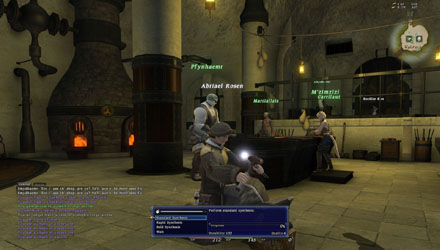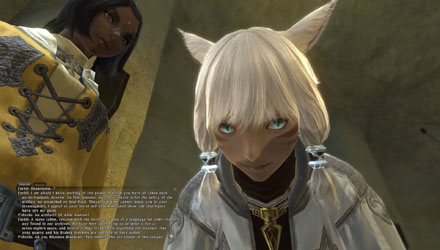Features & News
Hands on: Final Fantasy XIV Beta
August 13, 2010, Author: Giuseppe Nelva
At any time (while not fighting) you can simply change your weapon (or tools, for crafting) with another to switch to the corresponding class. Every time you use that weapon/tool successfully (by crafting, gathering or hitting monsters), you earn skill points that allow you to level up that class, earning new abilities. Once you’ve learnt an ability you can freely use it even with other weapons/classes, even if their effectiveness will be a little lower. To put it down simply, if you’re playing as a Gladiator (that’s pretty much a tank), you can still freely use the abilities that you learned with the other weapons, mixing and matching them with the Gladiator ones in order to tank more effectively, to deal more damage or to improve your aggro control. The combinations are basically endless, allowing you to tailor your character, its abilities and its stats, to your own playstyle in a completely dynamic and intuitive way. Of course it remains to be seen how this system will hold up when faced with the challenges of the endgame (of which we know absolutely nothing at the moment), but for now it works very well, and it’s definitely unique in the MMORPG field.
With eleven of the eighteen classes available at launch dedicated to gathering or crafting, it’s quite evident that this aspect of the game has been given a lot of thought. From the beta it seems that the economy will be mostly player-driven, with NPC vendors only providing very basic pieces of equipment. Most of the advanced equipment and tools seems, for now, an exclusive of player crafters. Food and potions seem to be at the very least as important as they were in Final Fantasy XI, providing a quite sizable source of income for cooks and alchemists and an equally sizable money sink for everyone else.
Crafting and gathering themselves are actually quite fun activities, executed through simple but engaging mini-games that pretty much exclude the possibility of using automated macros to perform them. Of course we’ll have to see if the mini-games will still be fun after a few thousand times, but at least in the beta I can pretty much say that crafting is well thought out, and with a little bit of refining could easily become one of the best systems in the genre.
One of the most interesting features related to the economy is the “retainer”, a personal NPC (you can have one per account, and purchase more for a monthly fee of a one dollar) that will not only act as a mule to carry your unused equipment, but also as an unmanned store that you can “park” somewhere to sell your items while you’re offline. This little innovation is actually a quite welcome one, as it removes the need to leave your computer on and online overnight in order to sell your wares directly to your customers. Processors and video cards will most definitely be thankful for the reduced wear and tear.

Heigh-ho, Heigh-ho, Its home from work we go...
One of the most jarring negative aspects of this beta is the almost complete absence of classic MMORPG quests. The only quests available are the equivalent of the “missions” from Final Fantasy XI, or the epic quests from other games, basically unfolding the main storyline of the game. There aren’t any side-quest given by NPCs, and at the moment there’s no information about the inclusion of those in release.
Side-quests granted by NPCs are normally under-appreciated by MMORPG players that tend to consider the usual FedEx and kill quests obsolete. Personally, though, I feel that they play an important role in making the game world feel like a living and breathing environment, where NPCs interact with you and aren’t simple man-shaped decorations or vendors. I really hope that they’re just part of the content that SE is withholding from the beta test and that they will make an appearance when the game hits the shelves or later when it will enter the open beta phase, especially since many of the quests in Final Fantasy XI, with their animated cut-scenes, were really neat.
On the other hand the actual “epic” quest line is definitely up to par with Final Fantasy XI standards (at least for what we were able to see in the beta, given the level cap), with very nice cut-scenes that will benefit at release from fully spoken dialogue.
Most of the leveling up, at the moment, is made through the “guildleves”. Guildleves are compact mini-quests assigned periodically by NPC guilds to each player and normally involve gathering a certain amount of materials, crafting certain items or killing certain monsters. They can be done both solo or in groups, and they’re quite effective in lowering the amount of grinding necessary to process. Despite that, I still feel that they won’t be able to completely replace normal NPC-driven quests, and I hope that Square Enix doesn’t think that they could. While fun, they lack the variation necessary to hold the whole leveling process by themselves.
A nice little feature is the official Player’s Site, a portal that acts as a hybrid between WoW’s Armory and a social network. Not only it allows each player to display his characters and their stats, but it also includes a fully fledged blogging feature with screenshots hosting that will let everyone share their experiences and adventures with fellow players. Square Enix seems to be putting a lot of resources into developing this little neat social network, so more features are expected to appear in the near future.

Lovely cutscenes enrich the main storyline...
As a conclusive note, the third phase of the beta that just began introduced two elements that will be very familiar to Final Fantasy XI players: the auto-translator and linkshells.
Linkshells are the Final Fantasy equivalent of Guilds. They work pretty much exactly as they did in Final Fantasy XI, with the only notable difference being the ability to choose a crest, instead of just a color that will be displayed near the linkshell name. For the ones that didn’t play Final Fantasy XI, the main difference with guilds in other MMORPGs is that everyone can be part of up to ten linkshells instead of a single one, switching between them by simply equipping the related item. This allows players, for instance, to have a social linkshell, one dedicated to raiding, one exclusive to their nation and so forth.
The auto-translator was a key system to Final Fantasy XI, and will be the same to Final Fantasy XIV. The beta already places gamers of all regions (Europe, US and Japan) on the same servers, allowing for complete international interaction. This cosmopolite environment was one of my favourite aspects of FFXI, and is quickly becoming the same for its sequel, as I normally grow very tired of having to deal only with people from my nation (seriously, I can just walk out of the door to speak with other Italians like me) and I firmly believe that having to play with people from completely different cultures is much more interesting. That’s what has given Final Fantasy XI one of the best MMORPG communities I ever experienced.
Of course this kind of cosmopolite approach involves some language barriers, especially (but not only) with players from Japan. With the auto-translator you can simply press tab while writing any word, and the game will present you with a series of options to complete that word or that sentence. Those words or sentences will be automatically translated, on the screen of everyone else, in their language of choice. While automated translation will never be perfect, it actually works great, and allows people to understand each other without too much trouble even without speaking a common language.
In conclusion, while a large part of Final Fantasy XIV is still a mystery even to the ones that are testing it. We can easily say that Square Enix has come a long way from its predecessor, learning quite a few key lessons and improving on many aspects of the game. Final Fantasy XIV seems not only to be an absolutely gorgeous game visually, but it also seems to be based on very solid class and combat systems. There are still quite a few elements, though, that need to be improved and refined, and some of them, like the presence or absence of NPC-Driven sidequests could easily prove a deal breaker for many gamers.
What we know so far, though, gives us a lot of hope in the potential for Final Fantasy XIV to be a really great game (provided that Square Enix manages to optimize performance), with a beautiful backstory, a lush world and great gameplay. What we don’t know, though, could just as easily turn the game into a flop. As usual, we’ll have to wait and see, hoping that the upcoming phases of the closed beta and the open beta will shed more light on the areas and mechanics that are still unknown. If anything substantial changes or gets introduced, you can be sure that I’ll write an update here on TIMJ as soon as possible.
Pages: 1 2
Feature Type: Hands On | Tagged beta, Final Fantay XIV, Hands-on, PC, Windows


